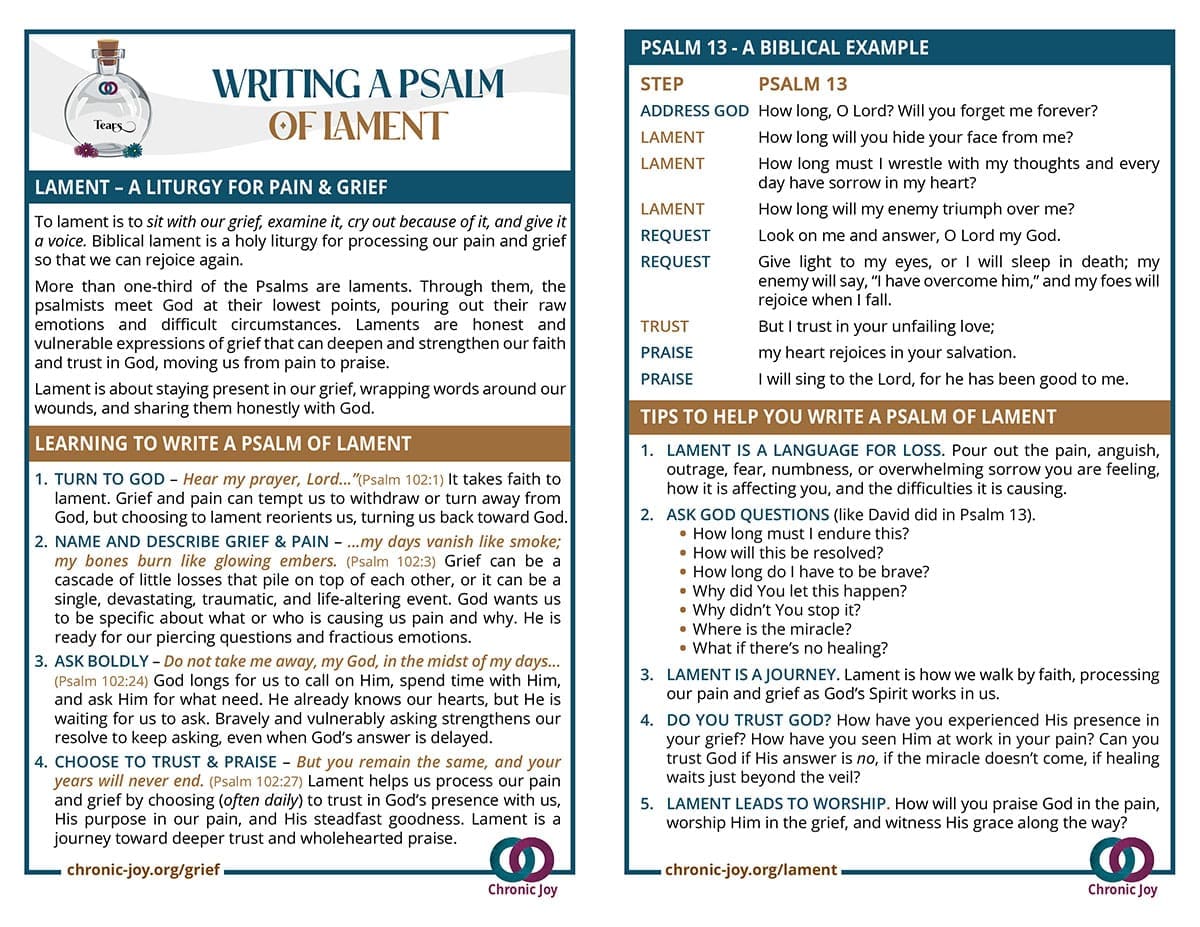Be merciful to me, Lord, for I am in distress; my eyes grow weak with sorrow, my soul and body with grief. My life is consumed by anguish and my years by groaning; my strength fails because of my affliction, and my bones grow weak. I am the utter contempt of my neighbors and an object of dread to my closest friends—those who see me on the street flee from me. I am forgotten as though I were dead; I have become like broken pottery. I always thank my God as I remember you in my prayers. Be strong and take heart, all you who hope in the Lord. (Psalm 31:9-12, 24)
BE STRONG
This lament from Psalm 31 stopped me in my tracks. Those words, written so long ago, speak to my experience with chronic illness even today. Perhaps you can identify too?
I felt sad again over what I have lost as I read these words: My strength fails, my bones grow weak, the object of dread to my friends – all words I need to release in prayer to the One who is big enough, strong enough, and more than ready to love me as He listens to my anguish.
What I’ve learned so far on this journey is that chronic illness is hard. To travel this road well, we need regular infusions of hope.
Don’t we all struggle with feeling forgotten, as though I were dead from time to time? Chronic illness is exhausting and frustrating. It’s a thousand tiny yet sustained losses because what we often feel (though seldom recognize) is grief.
LAMENT HELPS WITH GRIEF
While acknowledging our pain, grief, and anger is necessary and good, we also need to find practical ways to begin to see hope again. Reading these words of lament gives me the gift of sitting with God in the hard. It allows His Spirit to be the balm of wounds. These wounds sometimes receive little attention as I spend more time caring for my physical condition. Perhaps it’s because physical pain screams louder, but our hearts and souls need care and treatment, too.
In the Bible, hope is the confident expectation of God’s promises. Its strength is rooted in God’s faithfulness. Yet often, getting to hope requires an arduous journey through the pain. The Bible offers many psalms of lament to help guide us through grief and to release what was in order to embrace what is. I need practical ways of finding hope because, like many of you, I tend to step off the path when it’s too cold, there is another health flare, or when I’m tired from poor sleep again, and the list can go on.
BIBLICAL LAMENT HAS A HEALING EFFECT
Lament came as a bit of a surprise to me because the simple idea of praying God’s words back to Him has a healing effect on the broken pottery that resembles my heart. I am learning that Biblical lament:
- restores a sacred dignity to our suffering. Lamentations, an entire book of the Bible, was written for our benefit to see the hard, often undignified wounding, disappointment, and anguish that the writers were experiencing to find dignity at the feet of God. If they can find dignity there, so can we.
- is a form of protest – a foot-stomping, gut-level honesty that helps us move through grief so we don’t grow bitter.
- provides a way to process our emotions with God. Lament is not complaining about God but to God. As ambassadors of God, we have the unique privilege of showing others that, regardless of what we feel, God is right there with us, guiding, holding, and sustaining us.
- is a place to voice our concerns to our Heavenly Father – all of them, even the ones we think we shouldn’t say. There are no shoulds or shouldn’t with lament. All we need is a willingness to reach for the Father’s hand. He will guide us one step at a time, always pointing us toward hope
BE STRONG AND TAKE HEART
As I hear Jesus whisper, I always thank my God as I remember you in my prayers, as He walks hand-in-hand with me through the hard – intimately understanding what it means to live with distress, sorrow, grief, and affliction – I am encouraged to be strong and take heart, all you who hope in the Lord. As I rest in God, I can indeed find peace and hope for the next step of the journey. I know I don’t carry my burden alone and needn’t look too far ahead.
PRAYER
Dear Jesus,
Grant us humility in our affliction and our illness as well as courage to ask for help and to receive your mercies, new every morning. Where we depend on others, let us gratefully receive their help, graciously releasing any shame we feel about being the one in need. In those times when our bodies falter, help us to release the sadness, frustration, and deep anguish into Your capable hands, guiding us through grief on our journey toward hope, purpose, worth, and joy. In Jesus’ name, amen.


Pamela Piquette
Executive Director and Co-Founder of Chronic Joy®
Pamela, a leader and a visionary following God's call to inspire those affected by chronic illness, mental illness, and chronic pain, believes that every precious life impacted by illness is both vital and purposed.
Pamela is a wife of more than 35 years, the mom of three married children, and a grandma of six. She is diagnosed with chronic migraines and other chronic conditions. She enjoys baking sourdough bread and chocolate chip cookies, drinking hot tea, being outdoors, and reading (almost always more than one book at a time).

Lament
Step in slowly. Sit with God. Allow yourself time and space to feel and experience your pain. When you’re ready, take up your pen and explore the precious and life-giving gift of lament.


Recent Comments